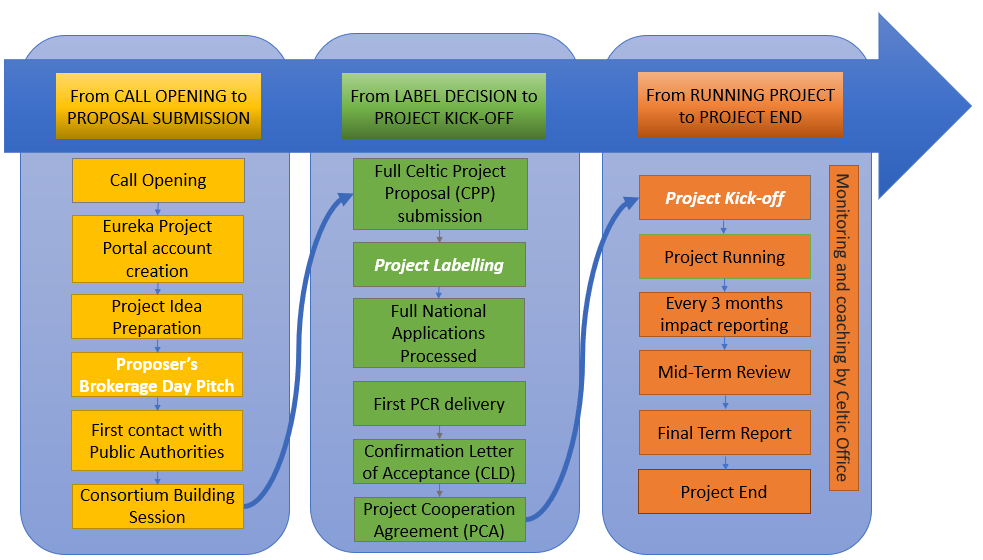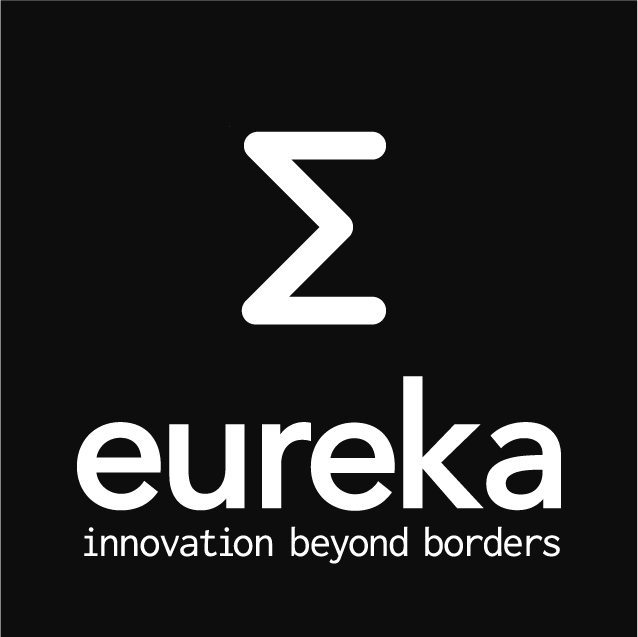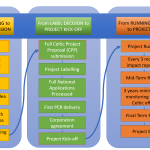Interactive map of Celtic-Next calls and projects
Click on the map to guide you through the cluster project process and navigate the website.

Second phase
This second phase will start after the label has been granted to the project by the Celtic Core Group and Office. The funding process by the PA must be completed as soon as possible, hence the first contact in the previous phase. All parties must sign the agreements, and the first PCR validation will launch the project's kick-off.
First phase
During this first phase, the proposers have the opportunity to prepare on their side before presenting to the Celtic Office and Authorities. With the Proposer's Day event, first informal pitch and review are made, giving the chance to participants and ideas to be shared and explored before the real CPP deadline.
Call Opening
Twice a year, a bottom-up call, spring and autumn calls, are open letting the opportunity to submit a project in the research areas of CELTIC and the current issues faced by Governments. Eureka Joint calls and flagships are also organised.
Learn more about our Calls & Have a look to our Research Areas
Eureka project portal account creation
The first step is to create a Eureka Project account to access tools and easily get guidance in proposing and building an idea. Update your Project Proposal any time until the deadline, using your registered account.
Project Idea Preparation
Proposers are free to define their project proposal according to their own research interests too and can submit it via our Online Project Portal.
Proposer’s Brokerage Day Idea Pitch
During our Proposer’s Brokerage Day for the call, take the chance to present your idea and expertise to attract funds and participants in your project.
First contact with Public Authorities
Get in touch with your national agencies as soon as possible (even before applying) to speed up the funding decision process. Remember that each project participant should contact their federal funding and follow specificities regarding each nationwide financing.
Consortium Building Session
Use the Brokerage tool to look at existing idea projects that could interest you, look for partners and expertise or even apply your own innovative idea.
Full Celtic Project Proposal (CPP) submission
Submit your Full Celtic Project Proposal by the deadline.
More help and information can be found in our Proposer’s Guide to guide step by step in launching your idea into a successful project.
Every guide and all call-related documents can be found here
Project Labelling
The evaluation of project proposals is made by the Group of Experts (GoE). The Celtic office organizes these project reviews and will then deliver or not the label according to the results.
Full National Applications Processed
The process of funding by the Public Authorities must be completed in this phase; hence the first contact made as earlier as possible.
First PCR delivery
The First Project Change Request must be delivered to the Celtic Office and your project coordinator within Celtic by the deadline. This first PCR shall include your modifications and improvements as requested in the labelling review recommendations.
Confirmation Letter of Acceptance (CLD/CLDoA)
The Confirmation Letter/Declaration of Acceptance (CLD) shall be filled in, signed for each consortium partner and returned to the office within two weeks after your proposal submission.
Project Cooperation Agreement (PCA)
After receiving a positive Label Notification, a Project Cooperation Agreement (PCA) should be elaborated and signed between the consortium partners.
Project Kick-off
The Kick-Off of a project is an essential boosting event to launch a project officially. This session allows participants, representatives from industry and public funding organisations, to share their visions and goals and present their work to the world.
Contact the Celtic Team to learn more about project Kick-Off
Last phase
This third and final phase of an ongoing project until its end will be completed with an impact report every 3 months from the participants to the Celtic Bureau, which will follow the project for a minimum of 3 years. In the mid-term, the project will be the subject of a mid-term review to be written. And at the end of the project, a final report will again evaluate its success, the allocation of its grant, and its operation until its end.
Project Running
When the two previous phases have been fully completed, the project is now active. The duration of a CELTIC project is approximately 3 years, but this period can vary depending on the project and other variables.
Every 3 months impact reporting
Every three months, project participants will have to handle an impact report to Celtic Office to keep informing the PA of the progress.
Mid-Term Review
Halfway through the project's life, a mid-term review will be requested from all participants to assess the project's progress and its resources and ensure continuity of success.
Monitoring and coaching by Celtic Office
The Celtic Office will be here to ensure a following-up of the project during its lifetime and for 3 years minimum.
Final Term Report
Before a project closure, the Group of Experts and the Celtic Office evaluate the project's last report to assess the outcomes of this research and future applications.
This is carried out to verify that the project achieved the goals laid down in the proposal and the project description.
Project End
Once a project ends, the Project Contract commits the participants to a CELTIC-NEXT Project session to finalise it so that all the expected project results are delivered and are of the agreed quality.
Learn more about why choosing CELTIC-NEXT to carry your project




